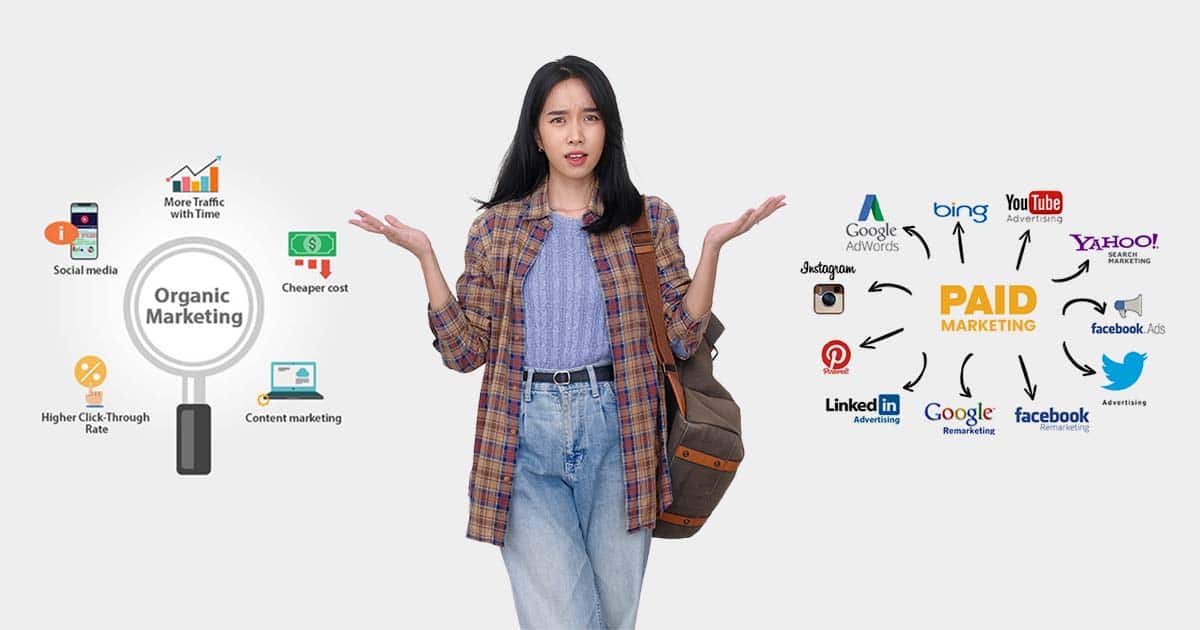Digital marketing is a big world, so for any business to succeed here, it must market itself effectively. Businesses often use effective marketing tactics to reach their targeted audience, drive traffic to their website and increase conversions. However, one significant difference between these tactics is whether they do it through organic or paid marketing. In this article, let’s look at organic marketing vs. paid marketing and find out when, why, and how to invest in each.
These two marketing strategies can be compelling; they reap phenomenal rewards when approached correctly. Both have their uses, and one isn’t inherently better. So, let us find out how they both differ.
Basics of Organic Marketing vs. Paid Marketing
When looking for organic vs paid marketing, it is essential to remember that both have their purpose. The marketing strategy comparison should be on which marketing tactic is better.
Let us start with fundamentals of organic reach vs paid reach:
What is Organic Marketing?
Organic marketing is a cost-effective marketing tactic for attracting traffic to a website. This strategy organically drives traffic to your website through Search Engine Optimization (SEO), social media engagement, content marketing, and other non-paid marketing strategies.
What is Paid Marketing?
Paid marketing refers to attracting traffic through paid advertising. It involves buying ad clicks from Google, X (previously Twitter), Facebook, banner ads, and sponsored posts.
Organic Marketing vs. Paid Marketing: Which One is Better?
Neither organic nor paid marketing is better than the other. They both serve their purposes and are most effective when used together. Even though you differentiate between these two marketing strategies, you can get a clear idea by knowing each other’s advantages.
Advantages of Organic Marketing
Here are just a few of the advantages of organic marketing:
Lower Cost Than Paid Marketing
Organic marketing costs are lower than any paid marketing. It costs nothing to set up a social media account like an X(Twitter) account or Facebook account and start posting regularly to drive more traffic. An engaging video script or blog post can cost a few hundred thousand, but tens of thousands of customers may view it over time. They can convert it into customers with just an initial investment in marketing.
Organic Marketing Offers Higher ROI
Though organic marketing needs an initial investment, the cost is less than paid marketing. The money you invest in SEO specialists, content creators, and web designers is just an investment that a business pays to them after they complete the work. Email marketing is an excellent example of an organic marketing channel with high ROI. With 99% of people checking their email daily, email marketing is a great way to reach and engage your audience.
Builds A Strong & Sustainable Marketing Foundation
With organic marketing, you have a strong and sustainable online presence. Investing in organic marketing, engaging with your audience on social media, and utilizing your SEO strategies will help you achieve a sustainable presence. The beauty of online marketing is that even when you are not running ads, you will still have a way to get new leads.
Authenticity
One of the key advantages of organic marketing is the authenticity it offers. Organic marketing gives its audience the feeling of being genuine because the content is more educational, valuable, and pertinent.
To conclude, organic marketing is a long-term, cost-effective strategy that enables businesses to bolster brand awareness, engage with potential customers, and promote their business and services through non-paid advertising.
Advantages of Paid Marketing
Here are just a few of the advantages that paid marketing can provide businesses of any size:

Easy to Attribute A Sale
Paid marketing makes it easy for a business to track where the sales come from. Using specialized tools like Google Analytics, you can see how many people clicked on which ad and how many of those converted into actual customers. By knowing which ads and landing pages are performing, you can maximize your ad spend for the ads that convert and apply paid advertising strategies for the best results.
Quick Results
Paid marketing strategies deliver rapid outcomes, making it an excellent choice for businesses seeking immediate results and broad reach in a short period.
Measurement
Measuring ROI is straightforward with paid marketing. With time and basic analytics, you can know how many clicks you must pay for before one of those clickers becomes a sale. You can also learn the average sale amount that results from that click so you can do the math to get a basic ROI.
Maximum Control Over Incoming Traffic
With paid ads, you have more control over the ebb and flow because you can increase or decrease the ad spend and visibility at will.
Highly Targeted
With paid marketing, you can precisely target your ads based on interests, demographics, online demand, behaviour, and more. This targeted precision guarantees that your message finds its way to the audience with the highest conversion potential.
Also Read: 11 Digital Marketing Skills You Should Master
Key Difference Between Organic and Paid Marketing Campaigns
Ultimately, the primary goal of both these marketing campaigns is to promote the company’s products and services to generate more traffic.
However, there are some key differences:
- Organic marketing can be evergreen, while paid marketing is temporary
- Organic marketing takes time, while paid marketing offers quick results.
- The organic market is more content-driven than paid marketing.
- Organic marketing is less expensive than paid marketing.
Why Is it Better to Use Both Paid and Organic vs. Just One or The Other?
Both organic and paid marketing have their place in digital marketing, but why is it better to use both marketing strategies together than choose one? The answer is that both
work well together. Most importantly, the benefits are immense because paid marketing will work until the money runs out. Organic marketing, on the other hand, keeps on working because it does not rely on financial support to perform well.
Conclusion
To sum up, neither organic marketing nor paid marketing is better than the other. Each has its pros and is suited to different goals. So, the debate of choosing between organic marketing vs. paid marketing is not fruitful; instead, combining both in your strategies will reap positive results for your business goals. The best businesses don’t discriminate. Instead, they combine them for maximum effectiveness.
If you missed out on knowing about organic reach vs paid reach or which marketing type is better, you can study that in detail with H1 Tags. We are a premier institute based in Delhi, offering certified courses in various digital marketing and graphic design.
Start your journey in digital marketing with H1 Tags!
Frequently Asked Questions (FAQs)
Q1: Do paid ads affect organic traffic?
A1: Paid ads don’t directly impact organic ads but complement organic SEO efforts.
Q2: Are SEO and content marketing part of organic marketing?
A2: SEO and content marketing are part of organic marketing. Both are cost-effective marketing strategies to drive website traffic by optimizing the content.
Q3: How do you measure the success of paid ads?
A3: There are various metrics to measure the success of paid ads like Click-Through Rates, Time-based Ads, Viewers, Conversions, ROI, etc.
Q4: How much do Google ads cost?
A4: Google ads cost around $100-$10,000 per month. However, the cost varies depending on factors like industry, ad networking, and campaign targeting.
Q5: What are some examples of paid marketing?
A5: PPC ads, paid social media marketing, affiliate marketing, influencer marketing, and paid email marketing are some of the most common examples of paid marketing.
